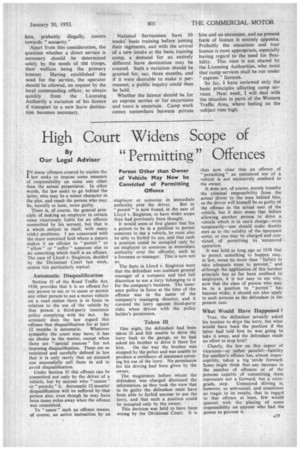High Court Widens Scope of " Permitting " Offences
Page 123

If you've noticed an error in this article please click here to report it so we can fix it.
By Our Legal Adviser IN many offences created by statute the law seeks to impose some measure of responsibility on some one other than the actual perpetrator. In other words, the law seeks to go behind the latter, who may be a minor character in the plot, and reach the person who may be, morally at least, more guilty.
There is, of course, the general principle of making an employer in certain cases vicariously liable for an offence committed by his servant, but that is a whole subject in itself, with many tricky problems. I am concerned with the more restricted field where a statute makes it an offence to " permit " or " allow " or " suffer " someone else to do something which itself is an offence. The case of Lloyd v. Singleton, decided by the Divisional Court last week, makes this particularly topical.
Automatic Disqualification
Section 35 of the Road Traffic Act, 1930, provides that it is an offence for any person to use or to cause or permit any other person to use a motor vehicle on a road unless there is in force in relation to the use of the vehicle by that person a third-party insurance policy complying with the Act. So seriously does the law regard this .offence that disqualification for at least 12 months is automatic. Whatever sympathy the court may have, it has no choice in the matter, except when there are "special reasons" for not imposing disqualification. These are so restricted and carefully defined in law that it is only rarely that an accused can successfully call them in aid to avoid disqualification.
Under Section 35 this offence can be committed not only by the driver of a vehicle, but by anyone who " causes " or " permits " it. Automatic 12 months' disqualification will be suffered by-that person also, even though he may have been many miles away when the offence was committed.
To "cause" such an offence means, of course, an active instruction by an employer or someone in immediate authority over the driver. But to " permit" is now found, in the case of Lloyd v. Singleton, to have wider scope than had previously been thought.
It would seem at first glance that for a person to be in a position to permit someone to use a vehicle, he must also be able to forbid its use, and that such a position could be occupied only by an employer or someone in immediate authority over the offender, such as a foreman or manager. This is now not so.
The facts in Lloyd v. Singleton were that the defenaant was assistant general manager of a company and had full discretion to use a lorry belonging to it for the company's business. The insurance policy in force at the time of the offence was in the name of the company's managing director, and it covered the lorry against third-party risks when driven with the policy holder's permission.
Taken Ill
One night, the defendant had been taken ill and felt unable to drive the lorry back to the garage, so he had asked his brother to drive it there for
him. On the way the brother was stopped by the police and was unable to produce a certificate of insurance covering his use of the lorry. No permission for his driving had been given by the owner.
The magistrates before whom the defendant was charged dismissed the information, as they took the view that to be guilty the defendant must have been able to forbid anyone to use the lorry, and that such a position could be occupied only by the owner.
This decision was held to have been wrong by the Divisional Court. It is thus now clear that an offence of "permitting" an uninsured use of a vehicle is not exclusively confined to the owner.
It does not, of course, merely transfer the criminal responsibility from the actual driver to the man behind him, as the driver will himself be as guilty of the offence as the actual user of the vehicle, but it does mean that before allowing another person to drive a vehicle which is in one's charge—even temporarily—one should make doubly sure as to the validity of the insurance cover, or one may be charged and convicted of permitting its uninsured operation.
It was held as long ago as 1938 that to permit something to happen may, in law, mean no more than "failure to take adequate steps to prevent," and although the application of this harsher principle has so far been confined to employers, it is not easy to see why, now that the class of person who may be in a position to " permit " has become wider, it should not also apply to such persons as the defendant in the present case.
What Would Have Happened ?
True, the defendant actually asked his brother to driye the lorry, but what would have been the position if the latter had told him he was going to take it away, and the defendant made no effort to stop him?
Clearly, the law on this aspect of vicarious—or rather parallel—liability for another's offence has, almost imperceptibly, taken a big -stride forward. Some might think that any increase in the number of offences or of the persons capable of committing them represents not a forward, but a retrograde, step. Uninsured driving is, however, so anti-social, and sometimes so tragic in its results, that in regard to that offence at least, few would quarrel with the placing of some responsibility on anyone who had the power to prevent it.
























































































































































